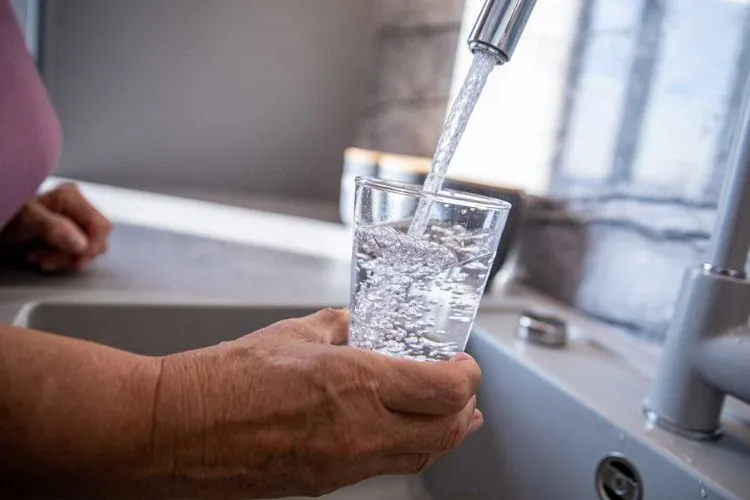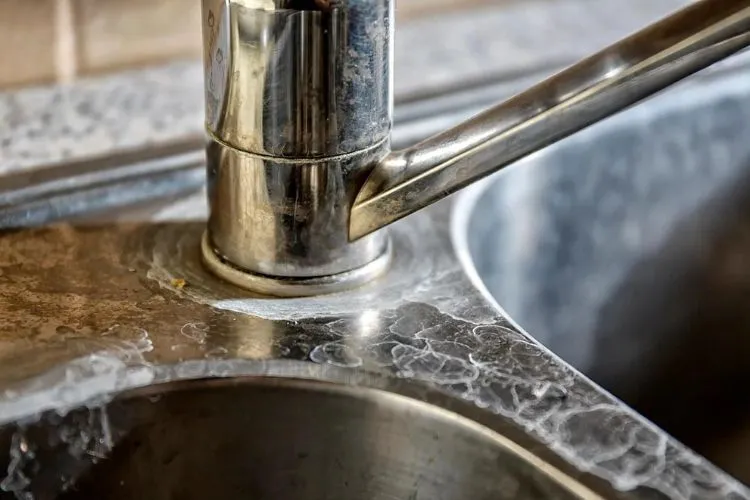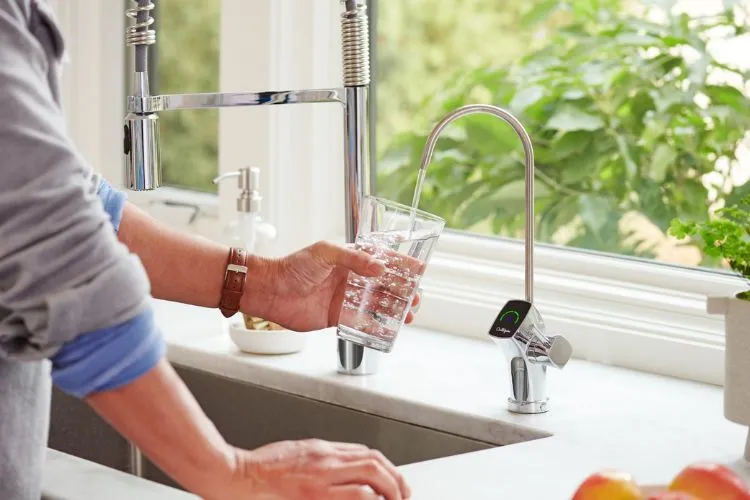Arizona, a state famed for its breathtaking deserts and iconic landscapes, faces unique challenges with water quality, particularly concerning the hardness of the water.
But, does Arizona have hard water?
Many residents and newcomers are often surprised by the impact of water hardness on their daily lives and household appliances.

This comprehensive guide seeks to shed light on the sources of Arizona’s hard water, its effects on both home and health, and the solutions available to mitigate these issues.
💦 Understanding Hard Water
Hard water is characterized by its high mineral content, primarily calcium and magnesium, which it acquires by flowing through deposits of limestone and chalk.
These minerals can lead to various issues around the home, which serve as indicators of hard water. From filmy spots on clean dishes to diminished soap lather and the buildup of scale on appliances, the signs can be both seen and felt.
💦 Does Arizona have hard water?
Arizona’s water comes from a variety of sources, including major rivers like the Colorado, Salt, and Verde, as well as underground aquifers.
The state’s geological composition, abundant in mineral deposits, naturally contributes to the hard water problem.
Reports indicate that cities within Arizona are among those with the highest water hardness levels in the United States, with measurements significantly exceeding the national average.
💦 The Effects of Arizona’s Hard Water
The implications of hard water extend beyond the annoyance of spots on glassware and include more serious concerns affecting appliances, plumbing, personal health, and the environment.

On Household Appliances and Plumbing
Appliances such as dishwashers and water heaters are particularly vulnerable to hard water. The mineral deposits can accumulate, reducing efficiency and longevity.
Plumbing systems too are not spared; pipes can become clogged with scale, leading to reduced water flow and pressure, alongside an increased risk of corrosion and leaks.
On Skin, Hair, and Overall Health
Beyond its impact on household chores, hard water can also affect physical well-being. It can dry out skin and hair, leading to irritation and potentially exacerbating conditions like eczema.
Moreover, while not harmful to consume, the taste and smell of hard water can be off-putting, influencing hydration habits.
Environmental Considerations
The environment also bears the brunt of hard water usage. The increased need for soaps and detergents — to counteract the reduced lathering ability of hard water — contributes to higher chemical runoff into water systems, impacting aquatic life and pollution levels.
💦 Battling Hard Water: Solutions for Arizona Residents
Living with hard water in Arizona does not mean accepting defeat. Various solutions can effectively reduce or eliminate the problems associated with hard water.
Water Softening Systems
The most definitive solution for hard water is the use of water softeners. These systems work by exchanging the minerals in hard water for sodium or potassium ions, effectively removing the cause of scale buildup and soap lather issues.
While salt-based softeners are widely used, there are also salt-free options that condition the water, preventing minerals from depositing on surfaces without removing them entirely.
Alternative Solutions
For those unable or unwilling to install a water softening system, other options exist. Filtration systems can remove many contaminants and, to some extent, soften water.
Magnetic and electronic descalers offer non-chemical alternatives to traditional water softening, though their effectiveness varies.
Home remedies, such as vinegar for cleaning limescale, can also help manage the symptoms of hard water, even if they don’t address the root cause.
💦 Safeguarding Your Home and Health
Proactive management is key to dealing with hard water. Regular testing, using either at-home test kits or professional services, can help monitor water hardness levels and the effectiveness of any softening or treatment systems.
For households facing severe hard water challenges, consulting with a professional to discuss more advanced solutions, such as whole-house softeners or reverse osmosis systems, may be beneficial.

Regular Testing of Water Hardness
Knowing the specific hardness level of your water is crucial for selecting the appropriate treatment method. It informs decisions on the type of water softening system to install and when to adjust or replace it.
Considering Professional Solutions
In cases where hard water significantly affects quality of life, exploring professional solutions is advisable.
Professionals can offer personalized advice based on the particular severity and impact of hard water in your home, ensuring that the chosen solution is both effective and efficient.
💦 Cost Analysis of Hard Water Solutions
Navigating through the maze of hard water solutions involves a critical look at the financial implications, including the startup costs, maintenance expenses, and potential long-term savings.
Initial setup costs for water softening systems can vary widely, starting from a few hundred to several thousand dollars, primarily depending on the system’s capacity and technology.
Maintenance, including salt or potassium refills for salt-based softeners, or filter replacements for salt-free systems, adds to the recurrent expenses.
However, these costs are often offset by the savings garnered from prolonged appliance lifespans, reduced energy consumption, and minimized spending on cleaning products.
Over time, investing in a water treatment solution can not only alleviate the nuisances of hard water but also prove to be an economically wise choice, offering tangible savings and enhancing overall household efficiency.
💦 Reviews and Recommendations
In the realm of hard water solutions, product reviews play a crucial role. Comparing popular water softeners, filtration systems, and descalers across efficiency, cost, and user satisfaction provides invaluable insights.
For selecting professional services for installation and maintenance, prioritizing licensed, highly rated companies with proven expertise in water treatment systems ensures reliability and performance.
This dual approach empowers homeowners to make informed decisions tailored to their specific needs, balancing cost-effectiveness with quality and long-term satisfaction.
Conclusion:
The hard water prevalent in many parts of Arizona can pose various challenges, but with the right information and solutions, these can be effectively managed or even eliminated.
From installing a water softening system to using alternative treatments like filters and descalers, residents have multiple options to combat the effects of hard water.
Regular testing and maintenance, along with professional advice when needed, will ensure that your approach to managing hard water is tailored to your specific needs, promoting a healthier home environment and lifestyle.
By understanding and addressing hard water, Arizonans can enjoy the beauty and uniqueness of their state without compromise.

Devon Shorts, a seasoned expert with over a decade of experience in water safety, shares valuable insights on this blog “Aqua Safety Plus”. Trust his expertise to keep your water clean and your family safe.
